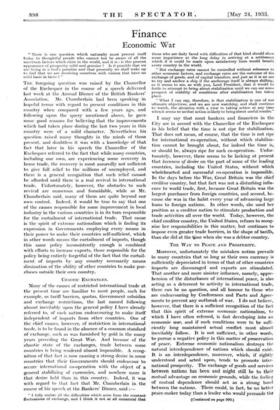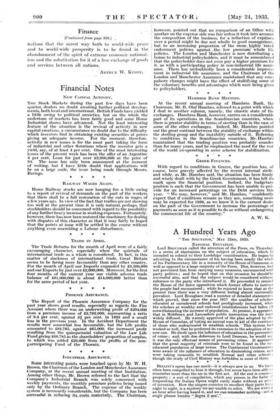Finance
Economic War
" There is one question which naturally must present itself today to thoughtful people who cannot but be aware of all the uncertain factors which exist in the world, and it is : is this present appearance of prosperity solid and genuine ? Is it possible that we are living in a fool's paradise and that presently we shall wake up to find that we are deceiving ourselves with visions that have no solid basis in facts ? "
THE foregoing question was raised by the Chancellor of the Exchequer in the course of a speech delivered last week at the Annual Dinner of the British Bankers' Association. Mr. Chamberlain had been speaking in hopeful terms with regard to present conditions in this country when compared with a few years ago, and following upon the query mentioned above, he gave some good reasons for believing that the improvements which had taken place during the last two years in this country were of a solid character. Nevertheless his question raised many thoughts in the minds of those present, and doubtless it was with a knowledge of that fact that later in his speech the Chancellor of the Exchequer referred to the fact that while many countries, including our own, are experiencing some recovery in home trade, the recovery is most assuredly not sufficient to give full relief to the millions of unemployed, and there is a general recognition that such relief cannot be afforded until there is a real revival in international trade. Unfortunately, however, the obstacles to such revival are numerous and formidable, while as Mr. Chamberlain said, many of them are quite beyond our own control. Indeed, it would be true to say that one of the causes responsible for some improvement in local industry in- the various countries is in its turn responsible for the curtailment of international trade. That cause is the spirit of extreme nationalism which is finding its expression in Governments employing every means in their power to make their countries self-sufficient, which in other words means the curtailment of imports, though this same policy inconsistently enough is combined with efforts to increase exports, those responsible for the policy being entirely forgetful of the fact that the curtail- ment of imports by any country necessarily means diminution of the ability of other countries to make pur- chases outside their own country.
CHAOTIC EXCHANGES.
Many of the causes of restricted international trade at the present time are familiar to most people, such for example, as tariff barriers, quotas, Government subsidies and exchange restrictions, the last named following almost inevitably upon the general policy I have already referred to, of each nation endeavouring to make itself independent of imports from other countries. One of the chief causes, however, of restriction in international trade, is to be found in the absence of a common standard of exchange, such as was furnished by gold in the many years preceding the Great War. And because of the chaotic state of the exchanges, trade between some countries is being rendered almost impossible. A recog- nition of that fact is now causing a strong desire in some countries that their Governments should endeavour to secure international co-operation with the object of a general stabilizing of currencies, and nowhere more is that desire held than in this country. Indeed, it was with regard to that fact that Mr. Chamberlain in, the course of his speech at the Bankers' Dinner, said :— " I fully realize all the difficulties which arise from the constant
fluctuations of exchange, and I think it not at all unnatural that
those who are daily faced with difficulties of that kind should show some impatience at the long delay in arriving at a settlement which if it could be made upon satisfactory lines would benefit every country in the world.
" But exchange rates cannot be controlled without reference to other economic factors, and exchange rates are the outcome of the exchange of goods, and of capital transfers, and just as it is no use to try and anchor a ship if the anchorage itself is always shifting, so it seems to me, as with you, Lord President, that it would be futile to attempt to bring about stabilization until we can see some prospect of stability of conditions after stabilization has taken place.
" What I can say, therefore, is that stabilization is one of our ultimate objectives, and we are now watching, and shall continue to watch, the situation with a view to taking action at any time when it seems to us that' action is likely to bring about useful results."
I may say that most bankers and financiers in the City are in accord with the Chancellor of the Exchequer in his belief that the time is not ripe for stabilization. That does not mean, of course, that the time is not ripe for international co-operation, without which stabiliza- tion cannot be brought about, for indeed the time is, or should be, always ripe for such co-operation. Unfor- tunately, however, there seems to be lacking at present that keenness of desire on the part of some of the leading countries, including the United States, without which wholehearted and successful co-operation is impossible. In the days before the War, Great Britain was the thief creditor country, but that fact was not a disturbing influ- ence to world trade, first, because Great Britain was the largest purchaser from foreign countries, and second, be- cause she was in the habit every year of advancing large loans to foreign nations. In other words, she used her position as a creditor nation to stimulate production and trade activities all over the world. Today, however, the chief creditor country, the United States, refuses to recog- nize her responsibilities in this matter, but continues to impose even greater trade barriers, in the shape of tariffs, than she did at the time when she was a debtor country.
THE WAY TO PEACE AND PROSPERITY.
Moreover, unfortunately the mistaken notion prevails in many countries that so long as their own currency is sufficiently depreciated in terms of that of other countries imports are discouraged and exports are stimulated. That another and more sinister influence, namely, appre- hension of the disturbance of international peace, is also acting as a deterrent to activity in international trade, there can be no question, and all honour to those who are endeavouring by Conferences and Pacts and Agree- ments to prevent any outbreak of war. I do not believe, however, that there is a sufficient recognition of the fact that this spirit of extreme economic nationalism, to which I have often referred, is fast developing into an economic war, and if such conditions were to be suffi- ciently long maintained actual conflict -must almost inevitably -follow. It is not sufficient, in other words, to pursue a negative policy in this matter of preservation of peaCe. Extreme economic nationalism destroys the natural interdependence of nations which should. exist. It is an interdependence, moreover, which, if rightly understood and acted upon, tends to promote inter- national prosperity.. The exchange of goods and services between nations has been and might still be to their mutual advantage on economic grounds, while the feeling of mutual dependence should act as a strong bond between the nations. There -could, in fact, be no better peace-maker today than a leader who would persuade the
(Continued on page 900.)
Finance
(Continued from page 898.) _ nations that the surest way both- to world-wide peace and to, world-wide prosperity is- to be found in the abandonment of the spirit of extreme economic national- ism and the substitution for it of a free exchange of goods and services between all nations. - --ARTHI.111 W. KIDDY.















































 Previous page
Previous page